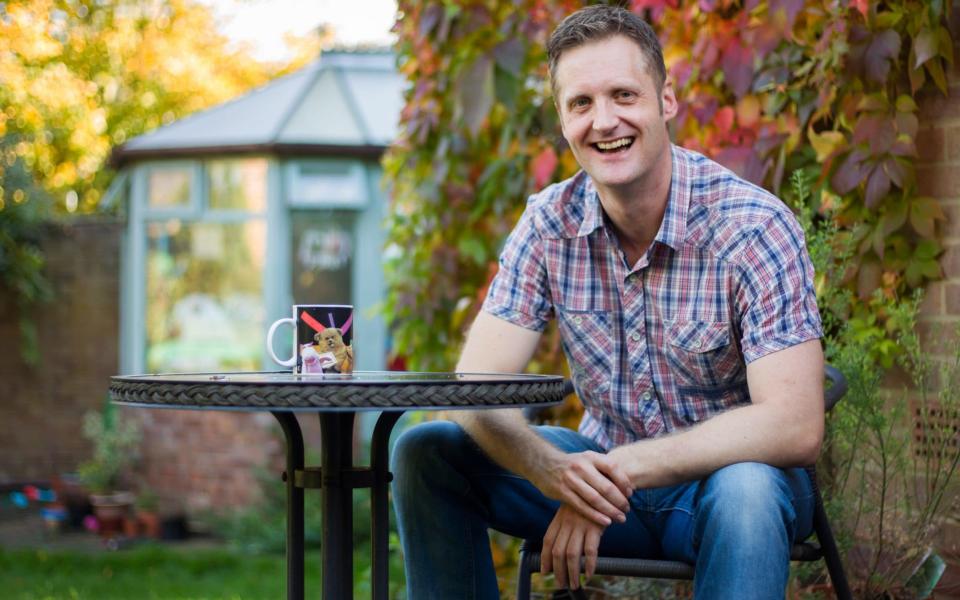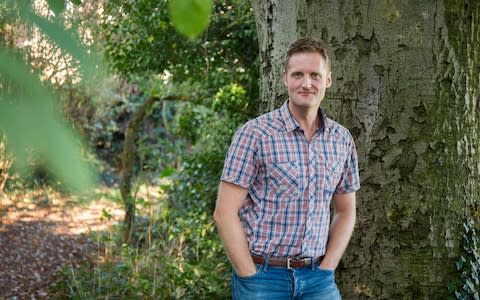Money makeover: 'How can I be self-employed, pay off my mortgage and retire by 60?'

"I’ve spent months doing research but still feel like I’m twisting in the wind,” Robert Dodsworth told Telegraph Money.
The 38-year-old is one of millions across Britain in search of the holy trinity: pay off the mortgage, save for a pension and retire early. A change in circumstances prompted Mr Dodsworth to look at his finances.
“I recently left my job with a local authority to become a freelance photographer. Now I’m self-employed my income can vary.”
Entrepreneurs get to follow their dreams but inconsistent cash flow can make managing money more difficult. With two children, aged seven and three, Mr Dodsworth and his wife Tanya, 40, who works part-time, want a plan for the future.
He said: “I’m pretty confused with all the information out there on where to put my savings and how much I should squirrel away. I’m a fairly adventurous investor – I need to be since the pots I have are small – but equally I have children and am self-employed so need a balance.”
Mr Dodsworth’s debt is a £10,000 loan for home renovations and £4,000 on an interest-free credit card. The family home has a £144,000 repayment mortgage, which he overpays on occasion.
He asked: “Should I pay down my mortgage or am I better off investing any spare cash? I don’t know, though I’m 40 next year and would love to pay off my mortgage before I’m 60.”

When Mr Dodsworth left his public sector job he also walked away from its generous defined benefit pension scheme. He had accrued a pot worth £50,000, too little to support his retirement plans. “I’ve just opened a self-invested personal pension (Sipp) with £2,000, which I want to increase but I’m not sure what to aim for,” he said.
“Ups and downs in my income mean it’s hard to know what I can save. I invest £200 in it each month but this could fall if I have a drought on the work front.”
While things are good Mr Dodsworth is also putting £400 each month into his stocks and shares Isa, where he has £33,000. Extra cash goes into a Lifetime Isa, now with £10,000. As a new freelancer his tax bill is as yet uncertain, but he expects it to be at the basic rate of 20pc.
He said: “Once I know my taxes for the year in December I can make sure I have those funds and then see what I’m able to put into the Isa or Lisa before the tax year end in April.”
Sensibly, Mr Dodsworth has put £4,000 in a high-interest current account as a rainy-day fund to cover the family’s expenditure for around two months. He and his wife save in Isas for the children but he doesn’t have life cover or income protection.
Mr Dodsworth envisages a future that is modest but comfortable: “I’m not a big spender. My TV is from 2007 and I’m not likely to replace it until it burns out. There are a few minor improvements to make to the home, and later I’d like to replace the conservatory. We live near the Norfolk coast and spend family time on local day trips, so holidays abroad aren’t a big deal now but it would be nice to do one every couple of years.”
Andrew Pennie, of specialist adviser Intelligent Pensions:
Becoming self-employed puts additional onus on Mr Dodsworth to generate regular work and be fit to do it.
He will have lost a number of local authority employee benefits: death in service, pension, holiday and sick pay. So insurance must be a priority – before mortgage and retirement goals he needs to protect his family. They should complete a shortfall analysis to see how much life cover they need.
As Mr Dodsworth’s long-term goals rely on him working he should get income protection and critical illness cover, though income protection may be hard to get as a new freelancer.
A sensible saver, Mr Dodsworth is using tax-efficient pensions over the long-term alongside a shortterm rainy day fund. To be safe he should increase the latter to cover six months’ expenditure.

Paying down debt is good, although a mortgage is typically the cheapest form of borrowing and other debts should be repaid first. It could help to switch to an “offset” mortgage, when savings are put with the same lender as the mortgage and used to reduce the mortgage interest payable.
His mortgage is £144,000 and he has £47,000 in savings. An offset mortgage would charge interest on £97,000 instead of £144,000, allowing him to use the spare cash to increase his emergency savings, or invest.
Mr Dodsworth has an interesting portfolio which has delivered terrific performance using some highly rated funds. Emphasis has been on looking for stellar performance and growth.
My reservation is: what is in the portfolio to provide defensive cover? Failing to address this could be a costly mistake.
Mr Dodsworth should consider some direct property, fixed income, infrastructure and possibly an absolute return fund. These assets should provide a defensive buffer if the stock market falls further.
Around 25-30pc in defensive assets would be worth considering. At 30pc, his portfolio has too strong a tilt towards the UK and should be reduced to under 20pc; single digit exposure would be sufficient.
His heavy Asian exposure should be rewarded in the long term, but this area tends to be volatile. He could trim this exposure and broaden it to include other emerging markets.
April Ritchie, of wealth manager Mattioli Woods:
Retiring early is a nice aspiration. Mr Dodsworth’s wife is still a member of the Local Government Pension Scheme (LGPS) so they should save via additional contributions to that rather than the Lisa, as it is more tax-efficient.
This type of pension generally provides a guaranteed income at retirement, which is hard to find these days, and increases in line with the cost of living. As a former member of the LGPS, Mr Dodsworth also enjoys these benefits. If he transferred out he would lose valuable guarantees.

Mr Dodsworth should save as much as possible into his Sipp, putting £400 per month into this pension pot and £200 into his Isa. Tax relief on pension contributions means saving £400 would put £480 per month into the Sipp.
As he’s looking to retire in 22 years’ time, this would mean contributions of £126,720. Assuming 4pc growth, this would provide a fund of around £205,000 by age 60. Converted into an income of 5pc, it would provide around £10,000 a year. The family must decide if they could live on that.
Mr Dodsworth cannot use his Lisa to fund a first home purchase and must therefore hold it to age 60 to avoid any penalty and receive the Government’s 25pc bonus. In the meantime he could repay his home improvement loan by taking money out of his stocks and shares Isa, freeing up cash for extra contributions to help the family reach its financial goals.
Mr Dodsworth could pay off his mortgage by the time he turns 60. But as he’s self-employed and has a young family, he may want to consider a fixed-rate deal for the next few years.
It’s not easy to achieve all your goals and objectives at once. Planning is essential to reduce that feeling of being twisted in the wind

 Yahoo Finance
Yahoo Finance 